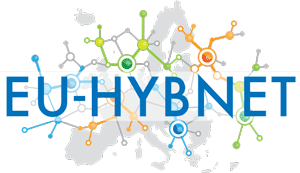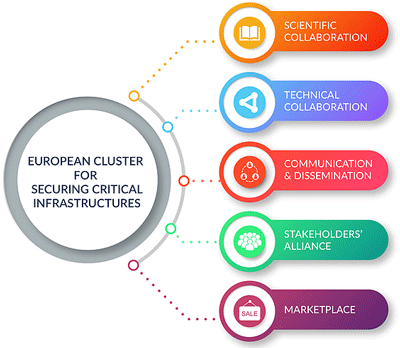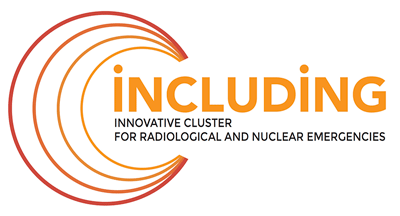PROJECT
SYNERGIES
EU-HYBNET currently has synergies with the following projects
NOTIONES
Participapating to the EU-HYBNET/CRITIS 2022 Ethics Workshop
SPOC: pasi.hario@laurea.fi
The vision of the NOTIONES (iNteracting netwOrk of inTelligence and securIty practitiOners with iNdustry and acadEmia actorS) network is to build and maintain a pan-European ecosystem of security and intelligence practitioners in order to (1) monitor technologic opportunities and advancements and best practices and (2) define and refine requirements and standardization needs.
In order to achieve this objective the project, coordinated by TECNALIA, combines the expertise of 29 partners from 21 different countries; including 15 military, civil, financial and judiciary practitioners as well as local, national and international law enforcement agencies.
VIGILANT
Exploring synergies ahead of the 4th Annual Workshop
SPOC: info@vigilantproject.eu
VIGILANT is an interdisciplinary consortium of leading researchers from computer science, social science and humanities, non-profit institutes, commercial partners, and police trainers to deliver an integrated platform of modular tools developed in FP7 and H2020 disinformation projects to our four partner Police Authorities from from Spain, Greece, Estonia and Moldova. VIGILANT will provide them with the technical capabilities necessary to combat disinformation and other related forms of harmful content (radicalisation, extremism, hate-speech) linked to criminal activities while at the same time building their institutional knowledge to provide them with an understanding of the social drivers and behavioural dynamics behind the phenomena. The project also includes first-of-its-kind disinformation response and investigation training for police officers. Finally, the project includes setting up a specialist European network for officers to share their experiences and knowledge and to promote a unified European approach to a problem that ignores borders.
MEDEA
SPOC: medea@medea-project.eu
MEDEA is an EU funded Coordination and Support Action project (GA 787111) that aims to establish and further develop a regional Network of practitioners and other security related actors in the Mediterranean and the Black Sea region in four critical areas:
- The management of migration flows and asylum seekers
- Border management and surveillance
- Fight against cross-border crime and terrorism, and
- Natural hazards and technological accidents
The project aspires to fulfill operational capability gaps identified by security practitioners operating in the M&BS Region. To that effect, it brings together researchers, academics, policy makers, and most importantly experienced security practitioners, to co-design and therefore enhance the efficiency of responses and the optimal anticipation and preparedness of events, with the ultimate goal of limiting – or altogether eliminating, when feasible - identified and frequently occurring risks and challenges, so that adversities are handled in a better equipped manner.
ATLANTIS
SPOC: info@eng.it
Critical infrastructure sectors are of vital importance for the functioning of a society and economy – from energy and transportation to healthcare and food production. Their protection from all types of threats, including natural and synthetic, unintentional and with malicious intent, is top priority. In this context, the EU-funded project ATLANTIS is addressing resilience at the systemic level against major natural hazards and complex attacks that could potentially disrupt vital functions of the society. Bringing together 39 European partners with complementary roles and skills, ATLANTIS is improving the resilience and the protection capabilities of interconnected critical infrastructure exposed to evolving risks. It is also increasing resilience through novel, flexible, and customisable security measures and tools.
Duration: 3 years (October 2022 – September 2025)
AHEAD
SPOC: thierry.hartmann@interieur.gouv.fr
AHEAD is a 30-month HE2022 project concerned with providing a tested prospective methodology tailored to the civil security domain. Taking into account long-term driving forces and contextual elements, it aims to generate foresight-informed roadmaps that anticipate the capability needs of civil security forces when potentially facing threats posed by new technologies. Concretely, iterative foresight exercises covering the 5 operational destinations of Horizon Europe Cluster 3 (crime and terrorism, border management, resilient infrastructures, cyber security and disaster resilient society) and involving a combination of workshops and interviews with multidisciplinary experts and civil protection representatives are to be conducted throughout the project. AHEAD's ultimate aim is to strengthen a forward-looking civil protection culture and embed in a more systematic way strategic foresight into decision-making.
ECSCI Cluster
2nd & 3rd ECSCI Workshop
SPOC: abie@nr.no
The European Cluster for Securing Critical Infrastructures (ECSCI) bas as its main objective to create synergies and foster emerging disruptive solutions to security issues via cross-projects collaboration and innovation. Research activities will focus on how to protect critical infrastructures and services, highlighting the different approaches between the clustered projects and establishing tight and productive connections with closely related and complementary H2020 and Horizon Europe projects. To promote the activities of the cluster, ECSCI will organize international conferences, and national or international workshops, involving both policy makers, industry and academic, practitioners, and representatives from the European Commission.
FINSEC
Participating to the 2nd ECSCI Workshop
SPOC: fabrizio.dipeppo@gft.com
FINSEC, (Integrated Framework for Predictive and Collaborative Security of Financial Infrastructures), is a flagship project which will develop, demonstrate and bring to market an integrated, intelligent, collaborative and predictive approach to the security of critical infrastructures in the financial sector. To this end, FINSEC will introduce, implement and validate a novel reference architecture for integrated physical and cyber security of critical infrastructures, which will enable handling of dynamic, advanced and asymmetric attacks, while at the same time boosting financial organizations’ compliance to security standards and regulations. As a result, FINSEC will provide a blueprint for the next generation security systems for the critical infrastructures of the financial sector.
RESISTO
Participapating to the 2nd ECSCI Workshop
RESISTO platform is an innovative solution for Communication CIs holistic situation awareness and enhanced resilience (aligned with ECSO objectives). Based on an Integrated Risk and Resilience analysis management and improvement process availing all resilience cycle phases (prepare, prevent, detect, absorb, etc.) and technical resilience capabilities (sense, model, infer, act, adopt), RESISTO
- implements an innovative Decision Support System to protect communication infrastructures from combined cyber-physical threats
- exploiting the Software Defined Security model on a suite of state of the art cyber/physical security components (Blockchain, Machine Learning, IoT security, Airborne threat detection, holistic audio-video analytics) and services (Responsible Disclosure Framework)
- for detection and reaction in presence of attacks or natural disasters.
Through RESISTO, Communications Operators will be able to implement a set of mitigation actions and countermeasures that significantly reduce the impact of negative events in terms of performance losses, social consequences and cascading effects, in particular by bouncing efficiently back to original and forward to operational states of operation.
EU-CIP
SPOC: emilia.gugliandolo@eng.it
EU-CIP is an EU-funded project under Horizon Europe (GA ID: 101073878) which brings together 20 partners under the coordination of Engineering Spa to establish a novel pan European knowledge network for Resilient Infrastructures.
EU-CIP will thus enable policy makers to shape and produce data-driven evidence-based policies, while boosting the innovation capacity of Critical Infrastructures (CI) operators, authorities, and innovators (including SMEs).In this direction, EU-CIP partners have already established the European Cluster for Securing Critical infrastructures (ECSCI), which brings together 31 projects that collaborate in CI Resilience.
EU-CIP will leverage the achievements of the ECSCI cluster to establish an EU-wide knowledge network with advanced analytical and innovation support capabilities.
Its main objectives are to:
- Enhance Europe's analytical capability regarding research outcomes, technologies, and policies - fostering data-driven evidence based policy and innovation development;
- Maximize the impact of R&I CIP/CIR activities in Europe through innovation support and solution validation services;
- Establish a knowledge-hub and create a vibrant ecosystem of interested and committed stakeholders around the project's results.
PRECINCT
Participating to the stakeholder workshop taking place on May 5th, as well as participating in the 2nd ECSCI Workshop
EU Critical Infrastructures (CIs) are increasingly at risk from a variety of intentional cyber-physical attacks (malware, terrorist driven exploits, etc.) as well as risks from natural hazards (e.g. extreme weather, fires, earthquakes, disastrous consequences of global warming) and hybrid threats including fake news. Recent research and emerging solutions focus on the protection of individual CIs (ports, energy distribution, hospitals, …), however, the interrelationships between CIs has become more complex and managing the impacts of cascading effects and enabling rapid recovery is becoming more pertinent and highly challenging. The PRECINCT project will provide a model-driven collaborative and unifying cyber-physical security and resilience management platform for smart resilient PRECINCTs, leveraging advances from CIP and INFRA-01 projects, as well as the extensive body of work in Urban and Critical Infrastructure protection and resilience management (RESILENS, DRIVER, RESOLUTE thus exploiting, evolving and embodying key outputs and knowledge gained into the PRECINCT models and services.
INCLUDING
Participating to The CERIS Event in Brussels, 2nd Workshop on Radiological and Nuclear Training Framework in the European Union.
SPOC: luigi.dedominicis@enea.it
August 1st 2019 marked the start of the 5-year (60 months) European INCLUDING project, which is bringing together infrastructure, equipment and experts coming from Medical Organizations, Fire Corps, Government Department, Municipalities, Law Enforcement Agencies, Ministries, Governmental and Civilian Research Institutes and Industries operating in the field of radiological and nuclear emergencies from across the EU. The INCLUDING (Innovative Cluster for Radiological and Nuclear Emergencies) Project pursues to develop a Federation in which individual Members will cooperate to provide a common framework to standardize access to their respective facilities, enhance interoperability and to allow a more intensive use of expensive equipment.
INCLUDING is a project funded by the European Commission in the framework of H2020 programme. It is part of the Secure Societies Challenge – Protecting freedom and security of Europe and its citizens. The funding scheme is CSA (Coordination and Support Action) and the topic of reference is: Pan-European clusters of practitioners and other actors in the field of Security (Subtopic Innovation clusters from around Europe managing demonstration sites, testing workbenches and training facilities).
INCLUDING connects 15 Partners from 10 EU Member States (MS), bringing together infrastructure, equipment and experts operating in the field of radiological and nuclear emergencies. Project is coordinated by ENEA Italian Agency for the New Technologies, Energy and Sustainable Economic Development.
GEMS
SPOC: bledifeta@yahoo.gr
The HORIZON EUROPE research project GEMS aims to contribute to the fight against the rapid spread of extremism across the gaming ecosystem. The GEMS´aims are: To contribute to a scientific advancement of the field of radicalisation and violent extremism by developing a new academic field of Sociology of Gaming and Radicalisation; To provide European Police Authorities (EPAs) with a novel Training Curriculum and an innovative tool, the Watchtower (a future-proof AI platform trained to recognise and prevent the spread of extremist content and recruitment in the online gaming space); To create a new cross-sectoral collaborative network dedicated to countering extremist presence in the gaming ecosystem – European Networks Against Gaming-Related Extremism (ENgaGE); To develop an effective Citizens Awareness Campaign and evidence-based Policy Solutions which will greatly improve high level decision making, empower citizens and enhance youth/gamers protection. In order to achieve these aims GEMS will coalesce the knowledge, expertise and experiences of the security community, the European police authorities, technical innovators, academics from a host of disciplines, policy makers and influencers, all led by a profound dedication to the protection and security of EU citizens. GEMS is a project which answers a particular security challenge, i.e., the presence of extremism in the gaming ecosystem. Consequently, it is envisioned as a product-oriented, practical project, with major contributions from EPAs and the technical sector, specically the AI developers. The overarching aim of the project is to minimize if not outright remove the threat of extremist recruitment in the gaming ecosystem in its earliest stages. GEMS will be in the position to reach this aim by focusing on arguably the only area where meaningful and effective intervention during the radicalization process is in fact possible, i.e., the in-game communication platforms.












